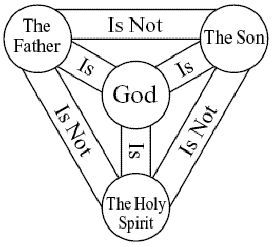The Trinity:
Three Persons, One God |
|
Our Triune God
| The Bible teaches us that God is
"Triune."
"Triune" is composed of two Latin words--"Tri"
(meaning "three") and "Une" (meaning
"one"). The word "Trinity" is derived from
"triune" and also means "three-one."
Though the word "Trinity" does not occur in
the Bible, the teaching |
 |
| of the "three-one"-ness of God is. The
Bible simply teaches that there is one God, but there are three persons in
this one God. The Father, the Bible teaches, is God. The Son, also, is God.
So is the Holy Spirit God. But there are not three Gods, but one God. |
Explaining The Trinity--The Bible
The Bible teaches the Doctrine of the
Trinity in numerous places. The Old Testament Book of Genesis teaches this
doctrine in the account of Creation in Genesis 1-2. St. Paul and others in
the New Testament also speak of God--Father, Son and Holy Spirit.
Jesus taught the Trinity in Matthew
28:19-20. In the Gospel of John, Jesus often mentions God, the Father as
well as the God, the Holy Spirit. By also claiming Himself to be God, Jesus
Himself teaches us this doctrine in a most convincing way.
Explaining The Trinity--The Creeds
Because the Trinity is taught in the
Bible, three ecumenical creeds also include this essential Christian
doctrine of the Trinity. The Apostles' and Nicene Creeds both
have three "articles" or divisions--one for each member of the
Trinity.
Each article of the Apostles' Creed,
for example, begins, "I believe in God, the Father Almighty...And in
Jesus Christ, His only Son, our Lord...I believe in the Holy Spirit, the
Lord and Giver of life..." The Nicene Creed follows the same pattern.
The Athanasian Creed, however,
goes into remarkable depth and detail on this essential doctrine. Because of
the confusion and controversy surrounding the Trinity, the fourth-century
Christian Church needed a statement--a creed--to clarify this Biblical
teaching. Athanasius, a prominent church leader at the time, led the
development of the Athanasian Creed, named in his honor.
The Trinity--The Athanasian
Creed
Found in most Lutheran Hymnals, the Athanasian
Creed is considered one of the definitive Christian statements regarding
the Doctrine of the Trinity. Divided into two main parts, the first part of
the Athanasian Creed contains key statements regarding the Trinity. Below
are five key statements regarding the Doctrine of the Trinity.
|
Excerpts
From
THE
ATHANASIAN CREED
A
Fourth Century Christian Creed
First,
Belief In The Trinity Is Absolutely Necessary For Salvation.
“Whoever
will be saved shall, above all, hold to the catholic (i.e. universal
Christian) faith. Which faith, except everyone keeps whole and
undefiled, without doubt he will perish eternally.”
Second,
Understanding the Trinity Is Necessary For Salvation.
“And
the catholic faith is this, that we worship one God in three persons
and three person in one God, neither confusing the persons [that is,
making them all the same person with three different names], nor
dividing the substance [that is, making each person of the Trinity
only one-third God]…”
Third,
The Father, Son and Holy Spirit Are Not Identical.
“For
there is one person of the Father, another of the Son, and another of
the Holy Spirit. But the Godhead of the Father, of the Son, and of the
Holy Spirit is all one: their glory is equal, their majesty
coeternal.”
Fourth,
As God, Father, Son and Holy Spirit Share The Same Divine
Characteristics.
“Such
as the Father is, such is the Son, and such is the Holy Spirit. The
Father is uncreated, the Son is uncreated, and the Holy Spirit is
uncreated. The Father is incomprehensible, the Son is
incomprehensible, and the Holy Spirit is incomprehensible. The Father
is eternal, the Son is eternal, and the Holy Spirit is eternal. And
yet they are not three eternals but one Eternal....”
Fifth,
Father, Son and Holy Spirit, Though
Separate And Fully God In Themselves, Are Together One God.
“So
likewise the Father is almighty, the Son almighty, and the Holy Spirit
almighty. And yet they are not three almighties but one Almighty. So
the Father is God, the Son is God, and the Holy Spirit is God. And yet
there are not three Gods but one God...."
He
therefore that will be saved is compelled thus to believe in the
Trinity.
|
Jesus In The Athanasian Creed
The second part of the Athanasian
Creed contains a detailed account of the Bible's teaching regarding
Jesus' two natures.
"It is also necessary for
everlasting salvation that one faithfully believe the incarnation of our
Lord Jesus Christ....It is the correct believe that we believe and confess
that our Lord Jesus Christ, the Son of God, is...perfect God and perfect
man....equal to the Father with respect to His divinity, less that the
Father with respect to His humanity. Although He is God and man, He is not
two, but one Christ."
As the Athanasian Creed correctly
declares, one cannot be saved unless one believes this essential, fundament
Christian teaching. Jesus had to be God to forgive our sins; He had to be
man to be our substitute. Without this understanding of Jesus, we fail to
understand the remarkable, miraculous work of God, the Son, who became
incarnate--human--to save us.
Explaining The Trinity
How do we explain the Doctrine of the
Trinity? The following are often used to explain the Trinity.
1) Triangle: Like God, a
triangle has three sides. Yet it is only one triangle. This is the most
common explanation of the Trinity and is often depicted as the following
diagram.

2) Water: Like God, water has
three forms--ice, water and steam.
3) Math: 1 x 1 x 1 = 1. Each
person of God is like the "1"--fully God, yet separate.
Ultimately, all of these analogies fail.
Why? Because we cannot describe God, who is greater than all of creation,
with humble elements within His creation. Christian Theologians have sought
to explain this doctrine for hundreds of years. Yet, it still remains
outside of our complete understanding.
Can We Understand God?
Should we expect to be able to understand
everything about God? No. After all, we're merely human beings. If we could
understand everything about God, we would be God. Since we are not Gods, we
simply cling to what God has revealed about Himself in the Bible...No more,
no less.
Though a prominent Biblical writer, St.
Paul also realized he could not fully understand God.
"Oh,
the depth of the riches of the wisdom and knowledge of God!
How unsearchable His judgments and His paths beyond tracing out!
Who has known the mind of the Lord?
Or who has been His counselor?"
Romans 11:33-34 NIV
We can't understand God. But we can trust His
holy Word which declares Him as Father, Son and Holy Spirit.
|